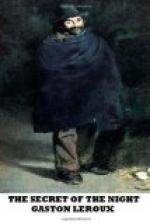unbelievable still. Matrena Petrovna smoked cigarettes
of yellow tobacco incessantly, rising almost continually
to make a hurried round of the rooms, and after having
prompted the servants to greater watchfulness, sat
and looked long at Rouletabille, who did not stir,
but caught every word, every gesture of each one there.
Finally, sighing, she sat down by Feodor and asked
how his leg felt. Michael and Natacha, in a
corner, were deep in conversation, and Boris watched
them with obvious impatience, still strumming the
guzla. But the thing that struck Rouletabille’s
youthful imagination beyond all else was the mild face
of the general. He had not imagined the terrible
Trebassof with so paternal and sympathetic an expression.
The Paris papers had printed redoubtable pictures
of him, more or less authentic, but the arts of photography
and engraving had cut vigorous, rough features of
an official — who knew no pity. Such pictures
were in perfect accord with the idea one naturally
had of the dominating figure of the government at
Moscow, the man who, during eight days — the
Red Week — had made so many corpses of students
and workmen that the halls of the University and the
factories had opened their doors since in vain.
The dead would have had to arise for those places
to be peopled! Days of terrible battle where
in one quarter or another of the city there was naught
but massacre or burnings, until Matrena Petrovna and
her step-daughter, Natacha (all the papers told of
it), had fallen on their knees before the general
and begged terms for the last of the revolutionaries,
at bay in the Presnia quarter, and had been refused
by him. “War is war,” had been his
answer, with irrefutable logic. “How can
you ask mercy for these men who never give it?”
Be it said for the young men of the barricades that
they never surrendered, and equally be it said for
Trebassof that he necessarily shot them. “If
I had only myself to consider,” the general
had said to a Paris journalist, “I could have
been gentle as a lamb with these unfortunates, and
so I should not now myself be condemned to death.
After all, I fail to see what they reproach me with.
I have served my master as a brave and loyal subject,
no more, and, after the fighting, I have let others
ferret out the children that had hidden under their
mothers’ skirts. Everybody talks of the
repression of Moscow, but let us speak, my friend,
of the Commune. There was a piece of work I
would not have done, to massacre within a court an
unresisting crowd of men, women and children.
I am a rough and faithful soldier of His Majesty,
but I am not a monster, and I have the feelings of
a husband and father, my dear monsieur. Tell
your readers that, if you care to, and do not surmise
further about whether I appear to regret being condemned
to death.”
Certainly what stupefied Rouletabille now was this staunch figure of the condemned man who appeared so tranquilly to enjoy his life. When the general was not furthering the gayety of his friends he was talking with his wife and daughter, who adored him and continually fondled him, and he seemed perfectly happy. With his enormous grizzly mustache, his ruddy color, his keen, piercing eyes, he looked the typical spoiled father.




